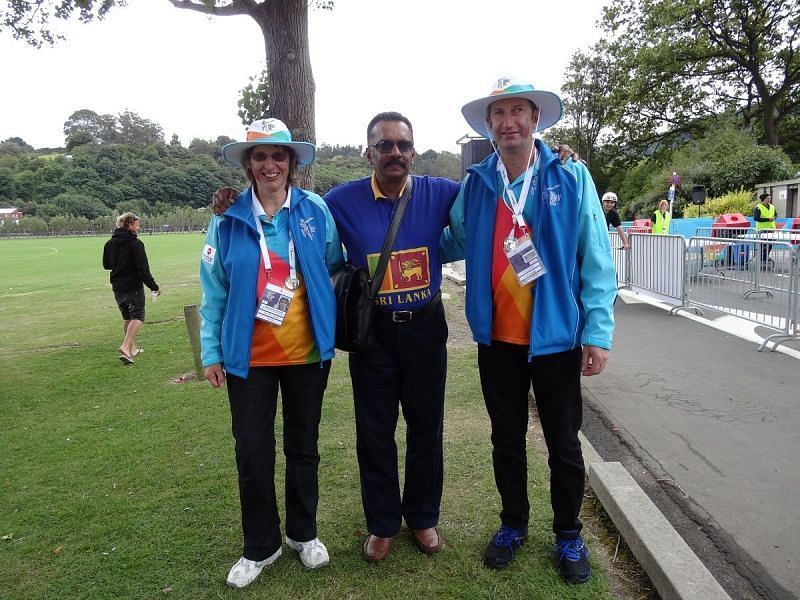
Travels, Travails and Tickets to Yet Another Cricket World Cup
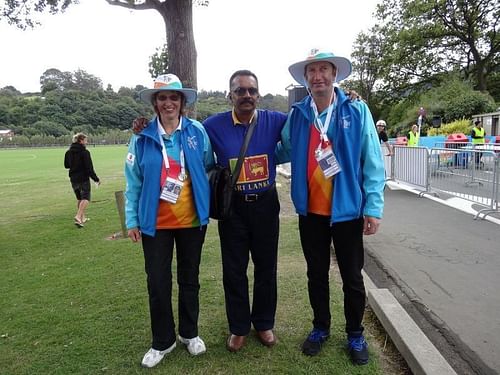
A fully cassocked priest playing cricket on the church green triggered a passion for cricket in me, several decades ago.
Years later, I was blessed with the good fortune to be present at virtually all epic moments in Sri Lanka cricket.
That included all seven world cricket tournament finals that Sri Lanka featured in - three 50-over’s, three T20s and one Champions Trophy.
While impatiently awaiting the delivery of match tickets for my fifth (50-over) Cricket World Cup, I have picked up a few unforgettable personal experiences during the previous editions, from my book, “Winds Behind The Willows”. It’s a story on traversing exotic lands, witnessing exciting moments of willow and leather on-field, and many memorable events off it, not in the public domain.
-------------------------------------------------- 1996 -----------------------------------------------
Fighting a huge hangover, I ambled out of bed the morning after the memorable 1996 semi-final between India and Sri Lanka. The phone rang. “Interested in going to Lahore for the World Cup final?’” my wife Champa - a cricket widow- inquired.
Sensing the silence at the other end, she explained, “George Steuarts Travel is arranging a charter flight from Colombo for 36,000 bucks, match ticket included.”
My “savings” was, around Rs. 2,000 in all. The silence from my end was deafening. Knowing what I was thinking, she promised to fund the trip herself. Apparently, her ex-colleague and our good friend Jagath had already booked.
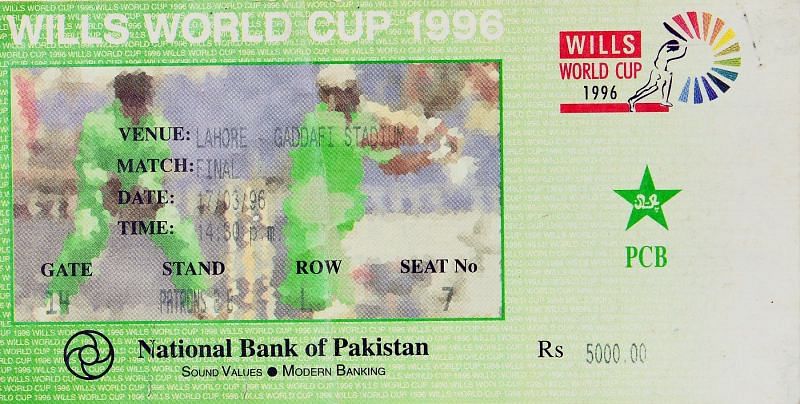
Two days to go for the final… the Pakistan High Commission in Colombo was chock-a-block. Champa made it easier for me to hand over the application due to the courtesy extended by the high commission staff to women.
Back to the high commission at 3.10 in the afternoon to collect the stamped passport, I joined a longer queue of around three hundred. For nearly a half-hour the queue hardly moved.
The crowd got restless and everyone gathered at the main gate. After another wait, the officials brought a table to their front garden and placed all the stamped passports on it. The drama began.
Picking a passport at random, the owner’s name was called. The first was A. K. Upali but funnily pronounced as A. K. Apali. The crowd roared with laughter. The owner didn’t turn up. A second name was called, with the same result. Unprecedented volumes had overwhelmed the process.
Meanwhile, Dammika Ranatunga, the elder brother of Arjuna, the latter-day CEO of the Sri Lankan cricket board arrived. A Pakistani security officer sporting a handlebar moustache took no notice and waved him away.
After fifteen minutes, Dammika returned and said, “I am the Sri Lankan captain’s brother and have come to hand over his wife’s and mother’s visa applications for the World Cup final. The visa officer wanted me to come in.”
Unbelievably, the security officer replied, “I told you [once]. Get out!”
Off he went.
The crowd, agitated now, vented their anger on the Pakistan high commissioner, who happened to arrive just then, with a well-executed ‘Bronx cheer’. Dammika turned up for the third time. This time – no hiccups please – an official was waiting for him at the gate.
For me, Lady Luck smiled again when Champa joined me after work at around 5.50 pm. The security officer immediately let her in and, thankfully, within five minutes she managed to find my passport from a lot containing over 350.
A lesson well learnt on the virtues of being married. Three hearty cheers for the lady! To this day I do not know when the others were able to get their passports back.
The day prior to the final, I learnt that my branch had won a prize in a deposit mobilisation competition that ended a few days before. Included was a return ticket to Singapore and S$ 200 pocket money for the manager, with as an option to be used for the World Cup final. Guess what? It worked out to exactly Rs. 36,000, no doubt divine intervention by the Good Lord!
Souvenirs from the 1996 Wills World Cup final
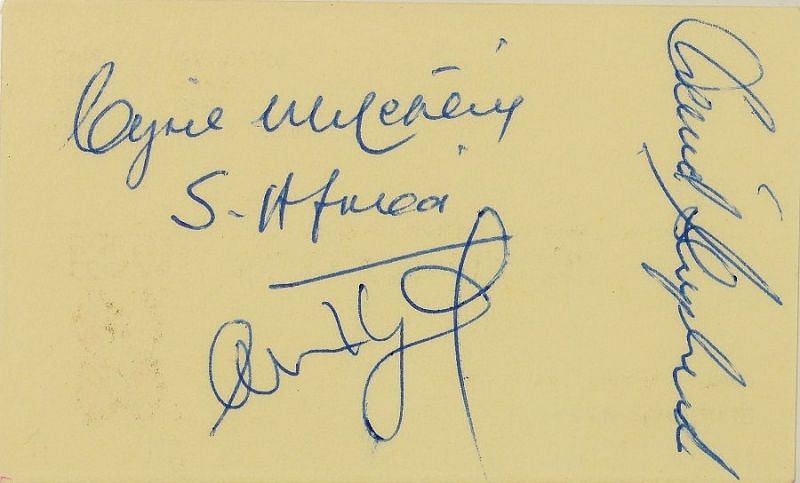
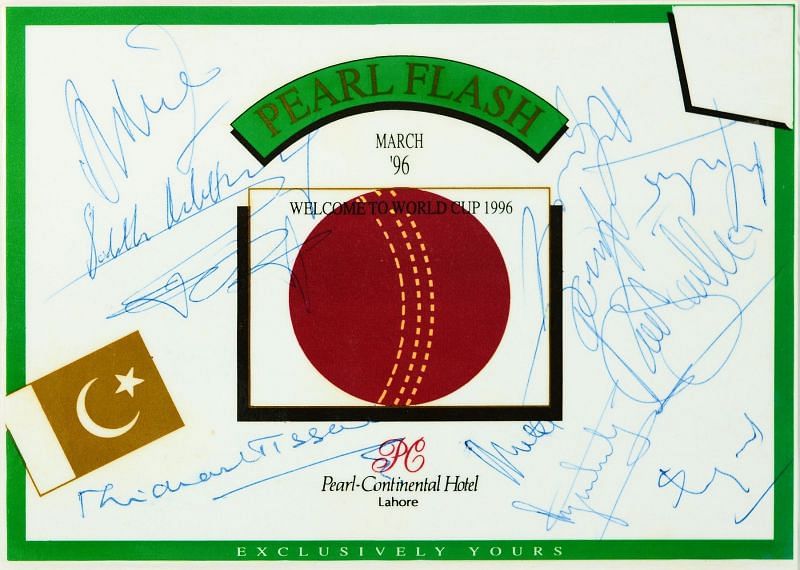
------------------------------------------------ 2007 -------------------------------------------------
Eleven years later, on the ultimate leg of our trip in the West Indies, all roads led to Barbados for the 2007 ICC Cricket World Cup final.
The afternoon before the final, we were back at Castries Airport, St Lucia, to take the flight to Barbados.
Though it was only 169 km or sixteen minutes flying, seats weren’t available on direct flights. Instead, an American Airlines flight was due to take us to Barbados via San Juan. To our horror, at the check-in counter, the clerk dropped a bombshell.
She politely said, “San Juan is in Puerto Rico, and since it’s a US protectorate, a US transit or visit visa is required.”
A moment’s astonished silence followed. After coming all this way, there was no chance we were not going to witness Sri Lanka’s appearance in the World Cup final.
I had a valid US visa, while Sitara’s and Jagath’s US visas had expired. Adrian too didn’t have one. The clerk then issued the boarding pass only to me. The others convinced me to take the flight and assured that they would make it somehow.
When the two-hour flight landed at San Juan at 3.50 pm, there was a text message from Jagath saying, “We offloaded the co-pilot and are on our way to Barbados!”
I was impatient to decode the SMS, as well as to know the fate of the others. After a seven-hour journey, I reached the hotel in Barbados. Minutes later, Sitara, Adrian, and Jagath appeared, and my eyes went heavenward.
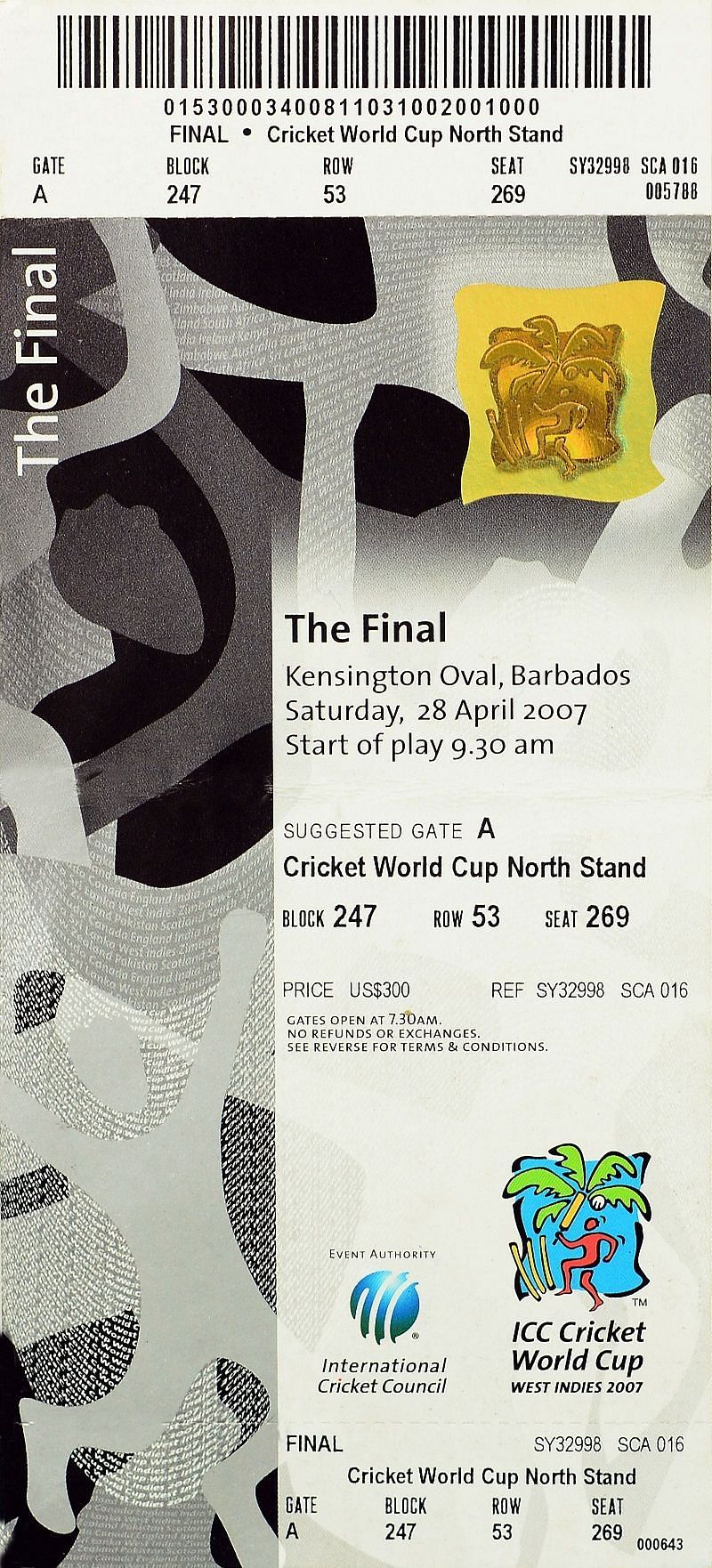
Jagath then related their aviation adventure, beginning from being offloaded at Castries.
“We saw a notice advertising charter flights to Barbados. We quickly booked three seats at US$ 300 each.”
“It was the last flight before the final,” he continued. “But, at boarding time, four more passengers turned up for the 6-seater Cessna. Seven for six!”
Looking at the issue from a pragmatic angle, Jagath, in a lighter vein, had then suggested to the pilot to fly without a co-pilot. He had instantly pooh-poohed the idea.
Then, the amiable Jagath had used his persuasive powers on the pilot. Somehow, he had managed to convince him that the only way ‘forward’ (upward) was to ditch the co-pilot since the flight was of such short duration.
Finally, the pilot had relented and said, “If the company is OK, I don’t mind.”
The charterer had then got Jagath to sign a document as the hirer of the aircraft, accepting total responsibility for the crew. Not in any way a cumbersome task to offload the co-pilot of an international flight to make way for a cricket enthusiast!
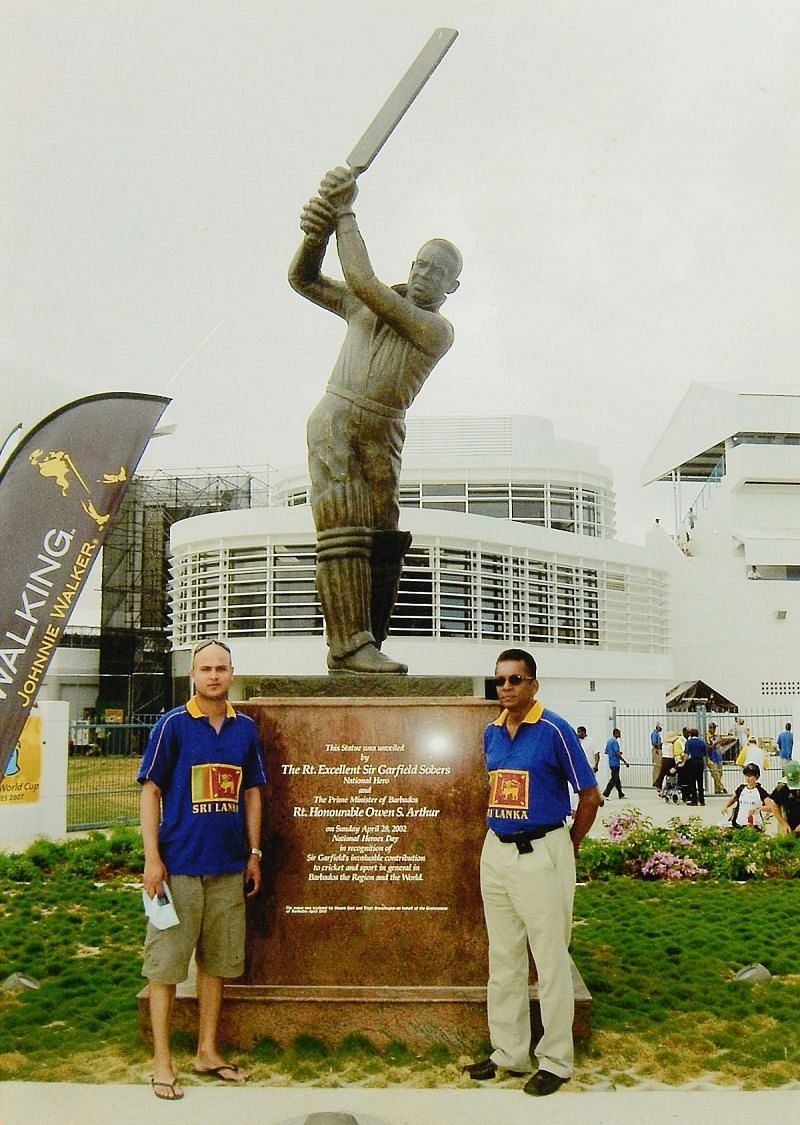
----------------------------------------------- 2011 --------------------------------------------------
The day before the first all-Asian Cricket World Cup final in 2011, we met Rajesh, a business associate of Jagath’s, for dinner in Mumbai. While enjoying the ambience and an array of fabulous Indian cuisine, our conversation shifted to the Police harassment that I suffered in Mohali, while watching India’s semi-final against Pakistan.
Expressing his regret, Rajesh called a known assistant commissioner of police (ACP) attached to the Mumbai Division. While introducing us, he requested the ACP to assist us in case of an emergency and gave his mobile phone number.
On our return to the hotel, I wanted to verify as to what items I could carry into the ground. Jagath called the ACP and he confirmed the ICC guidelines. Personal cameras, mobile phones, and small handbags were permitted, but commercial cameras, including video cameras, wouldn’t be.
In addition, I knew that lighters, matches and even cigarettes wouldn’t be allowed; strangely enough, this rule seems valid only in the subcontinent.
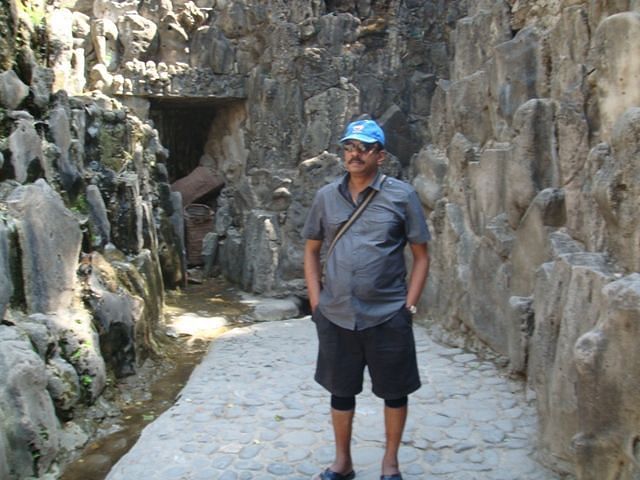
Come match day, a sea of heads greeted us at 10.15 in the morning. The queue hardly moved and the wait seemed endless. Nearly two-and-a-half hours passed before we approached the main gate to the stadium proper. The satisfaction of reaching the destination, however, was short-lived.
The notice on a tree a few metres ahead of the gate conveyed that, among other items, cameras and bags were not allowed inside. Jagath and I looked at each other. Did the ACP sell us a dummy?
A police officer at the gate was adamant that I throw away the camera and the shoulder bag before he could allow me in. I was thinking, How dare he say that? Does he have any idea of their worth? – which I translated to a polite request to the man at the gate..
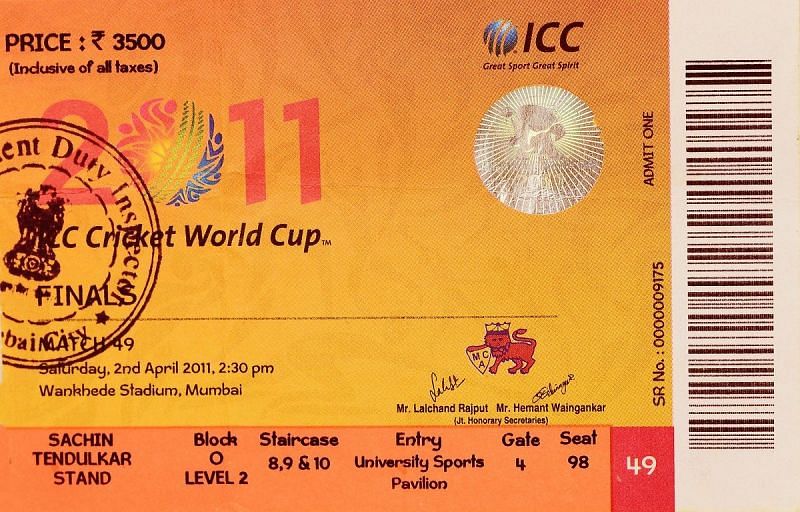
Our pleas fell on deaf ears. The ACP was our last hope and Jagath called him. He wanted to speak to the officer, who indignantly ignored our request. The ACP then wanted to speak to the most senior officer at the gate. Precious minutes were ticking and I was getting restless. Jagath calmly looked around and identified a senior officer from the insignia on the epaulette.
He then went to the officer, offered the phone and said, “the assistant police commissioner of Mumbai wants to speak to you.”
“Who?” the officer asked annoyingly.
Jagath repeated, “the assistant police commissioner of Mumbai.”
Without batting an eye, the officer retorted, “I don’t know him,” and looked the other way.
A junior officer outside the gate was sympathetic. He was part of the security barrier that had cordoned off the approach road from the opposite direction. He gave us directions on a shortcut to the hotel. Walking briskly on a pedestrian footbridge over the nearby railway line, we hailed a taxi back to the hotel to lodge the camera and bag.
It was a heart-stopping roller-coaster ride, but we were back in twenty-five minutes. Thankfully, the same officer allowed us through the barrier. Once two physical frisks were done, one at the main gate and another inside and we walked through a metal detector, lo and behold; we were relieved to be at the Sachin Tendulkar Stand of the Wankhede Stadium, akin to the proverbial light at the end of the tunnel!
---------------------------------------------- 2015 ---------------------------------------------------
A day after the heart-stopper between Sri Lanka and Afghanistan in 2015, it was time to wander the wonders of Dunedin. We began with the First Church of Otago, then a Cadbury World tour. Olveston House was next.
From one historical home, we hopped into another – Larnach Castle. Built in the late 19th century, the 43-room castle is considered as New Zealand’s only “castle”. It offers an insight into a wealthy Victorian lifestyle, with an intriguing story of scandal and suicide thrown in for good measure.
Cruising the length of the Otago Harbour and its beautiful bays, we then passed Carey’s Bay historic fishing village, Port Chalmers, hills, farmland, and forest. Watching New Zealand fur seals playing and swimming at close quarters was fun.
Among the many marine birds, the northern royal albatross was the crowd’s favourite, closely followed by the little blue penguins, the world’s smallest at 33 cm.
A short bus ride then took Jagath and me to Penguin Place, a private conservation reserve, to see one of the most endangered species in the world in its natural habitat. Pin-drop silence ensued as we waded through the wild on foot, through unique “covered trenches” into “viewing hides”.
Our guide, Chris, who doubles as a tree climber in the reserve, whispered, “The smaller the visitors’ group, the better the chances of seeing.”
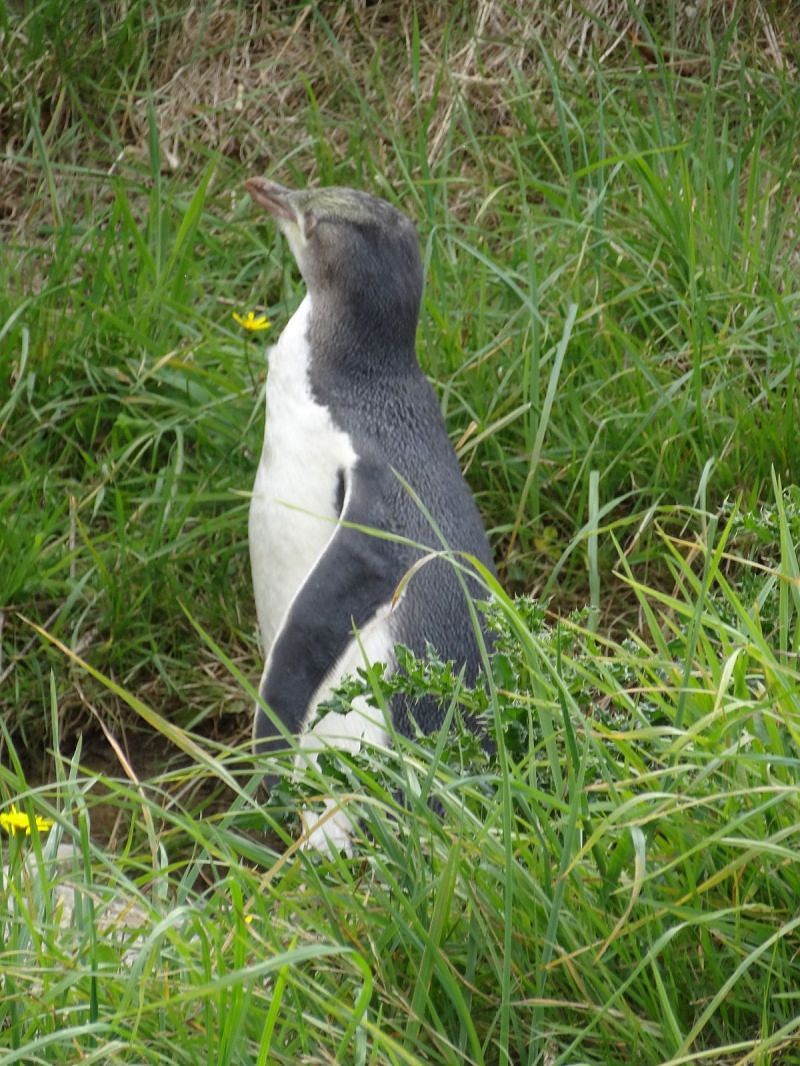
Beautiful, quirky yellow-eyed penguins are only found on the south-east coast of New Zealand and, minutes later, we spotted the first one. Then a few others popped up here and there, from nowhere. Some were even less than ten metres away. With my flash turned off to kill the sound, I added a few memorable photos to my travel collection.
Note: The above has been adapted from the book, “Winds Behind The Willows: A Sri Lankan’s life in love with cricket”, which was awarded Sri Lanka’s “Best Sports Publication & Author of the Year 2017”, and made the shortlist of Sri Lanka's State Literary Awards 2018.
Also read - Most world cup wins
Follow Sportskeeda for all the updates on World Cup teams 2019, schedule, news, points table, cricket world cup live score, most runs, most wickets and fantasy tips.